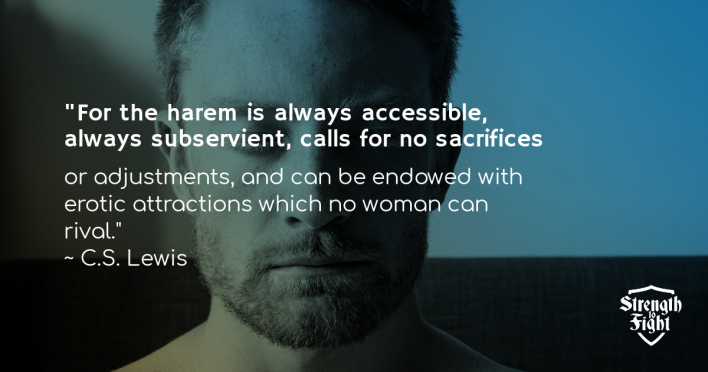By: Brad Pullan
I’m convinced that spending time sexually fantasizing about people (who aren’t your partner/spouse) is very harmful.
Before going further I want to make it clear that I am NOT addressing married couples desiring and thinking about each other. While there are both healthy and unhealthy ways of thinking about your spouse, for the purpose of this article I’m going to focus on the serious problems of sexual fantasizing about someone who isn’t your committed partner/spouse, which includes a single person fantasizing about another single person.
When I describe sexual fantasy, I am not talking about having a quick thought enter our mind and then ignoring it.
I am talking about letting thoughts or scenarios manifest in our minds for longer periods of time, possibly becoming a magical escape with an imaginary person.
There are three reasons why I believe sexual fantasizing to be so harmful: unrealistic control and comfortability, the seemingly limited consequences, and this ‘person’ becoming an object.
The problem with Fantasy
- Unrealistic Control & Comfort:
Whether your fantasy is perverse or seemingly harmless, you unrealistically control every aspect of it.
The individual fantasizing chooses:
-the location
-the time
-the person/people they are fantasizing about
-the result and performance
-the imaginary person’s actions and feelings:
This chart below gives further demonstration of fantasy vs reality:
| Feelings and behaviour | Fantasy | Real Life |
| Consent | The only consent needed is from yourself, to play out whatever scenario you want in your head. Doesn’t take courage, because you don’t fear being rejected. | Rejections happens a lot. But facing the fear of rejection takes courage and is a good thing. Likewise, respecting someone rejecting you also develops character and perseverance. |
| Mood | Dependant on the mood you give the imaginary person. I highly doubt most fantasizers give the imaginary person a terrible mood. | From my understanding of the human race, it tends to fluctuate. |
| Fears | In a fantasy you don’t have to bother with fears of the future, or fears about where the imaginary person’s heart lies. You and the imaginary person behave how you want, and ‘just live in the moment’. More simply, there is nothing at stake. | There are a lot of healthy fears that must be grappled with to share real intimacy. “Is this person really committed to me?” “Do I really love this person?” “Does this person really love me?” “Will I just end up hurting this person?” “Will he/she end up just hurting me?” |
| Satisfaction & Pleasure | In fantasy, satisfaction is dependant on you and what your imagination finds satisfying. It doesn’t take much work. | To build intimacy takes a lot of work, and isn’t always satisfying. It requires much selflessness towards the other person. |
- Seemingly no direct or immediate consequences.
Let’s say someone is caught coming on a little too strong, or even sexually harassing someone, this person will have to deal with the consequences of rumours, their reputation attacked, potential loss of jobs or friendships. However, if it’s all just a fantasy, none of these consequences will apply. In a fantasy the person you are sexually harassing won’t think it’s harassment, they will give 100% consent to it, and in fact, they will probably be thankful that you showed up in their life.
The problem, however, is that there are very large consequences to sexual fantasy. Perhaps one of the biggest is how it feeds our self glorification and ego.
C.S. Lewis captures this when he writes about the serious consequence of sexual fantasy to Keith Masson (found in The Collected Letters of C.S. Lewis, Volume 3)
“For the harem is always accessible, always subservient, calls for no sacrifices or adjustments, and can be endowed with erotic and psychological attractions which no woman can rival.
“Among those shadowy brides he is always adored, always the perfect lover; no demand is made on his unselfishness, no mortification ever imposed on his vanity.
“In the end, they become merely the medium through which he increasingly adores himself. . . . After all, almost the main work of life is to come out of ourselves, out of the little dark prison we are all born in. Masturbation is to be avoided as all things are to be avoided which retard this process. The danger is that of coming to love the prison.”
- The imaginary person become things we use and consume, instead of people we could love and genuinely care for.
Strength to Fight uses the hashtag #LovePeopleHatePorn, because one of the best ways to help people fight for porn-free lives and porn-free communities, is to see the beauty of each individual person, and love them for how they are made. Porn hijacks our ability to appreciate humans for their deep worth beyond their bodies. I believe the same applies to sexually fantasizing. In a fantasy, the imaginary lover is just a means to an end to fulfill whatever pleasure or comfort we desire.
As C.S. Lewis writes in his book the “The Four Loves” (If C.S. Lewis wrote it, you know it’s good)
“We use a most unfortunate idiom when we say, of a lustful man prowling the streets, that he “wants a woman.” Strictly speaking, a woman is just what he does not want. He wants a pleasure for which a woman happens to be the necessary piece of apparatus. How much he cares about the woman as such may be gauged by his attitude to her five minutes after fruition. one does not keep the carton after one has smoked the cigarettes.”
I’m very certain when I say that fantasy in which the imaginary person is just a means to an end, is nothing short of mental slavery. A much truer freedom, is being able to love people for who they are inside and genuinely care for their well-being beyond their sexual attraction.
So what do we do about this?
- Follow the fantasy:
Often after the sexual exchange occurs, that’s when the fantasy ends.
Next time you catch yourself fantasizing, skip ahead to the next scene. Think about how you would feel after. What would be the consequences? What would this do for your heart, soul, and mind? What type of shame and guilt would come from this? How long would you live with that shame? Would you ever confess to someone? What would that do to your life?
It may seem thrilling in the moment, but if you follow through what would actually happen if your fantasy become true, it becomes a lot less appealing.
- Think about how your spouse & or future spouse would feel:
This one is pretty simple, but imagine telling your spouse/partner about what was truly going on in your mind. Or imagine if they could read your mind, and the incredible damage and hurt your fantasy would bring to them and yourself. If you share this fantasy, do you think you would be building up their esteem, or tearing it down?
- Discipline your thoughts:
What you think, imagine, and tell yourself is incredibly powerful. Instead of letting scenarios play into your mind, cut them out, and speak to yourself words of truth, faithfulness, commitment.
Here are a few examples of things you could practice saying to yourself.
“My heart, soul, & mind, is most satisfied when I am 100% committed and faithful to (insert partner’s name.”
“I will be faithful to (insert partner’s name) whether they deserve it or not, because Christ has been and is always faithful to me when I certainly have not deserved it.”
“Because God promises me he is faithful, and that he will never leave me or forsake me (Hebrews 13:5) so will I be faithful to (insert partner’s name) physically, mentally, and emotionally.”
- Accountability.
Having someone who you can share these struggles with is very important. Accountability isn’t just a step that needs to be taken for porn watchers. It takes a lot of courage, but accountability will allow you to speak out and verbally process what is going on in your mind. Of course before you do this, you should make sure you are sharing with someone who is wise, cares about your well-being, and is trustworthy. Similar to porn, when sharing the details, be specific, but not graphic.
When getting into the specifics it is important to spend time going through these types of questions together.
Why is this happening?
What are the consequences?
What lies am I believing about myself?
What lies am I believing about the imaginary person that I am fantasizing about?
What needs am I trying to have met by these fantasies?
What are more healthy alternatives to have these needs met?
How can we together encourage each other to pursue grander things?
Asking these questions, and working through these things together will also help relieve the burden of inward shame that these fantasies most likely weigh on you.
- Find your deeper purpose and passion.
In Michael John Cusick’s first chapter of his book Surfing for God, he makes a strong analogy when talking about how porn hijacks who we were made to be.
“Wouldn’t it be rather odd if a trained fighter pilot never left the hangar for fear of not knowing how to fly the jet? Or consider the gifted sculptor who never picked up his hammer and chisel because he couldn’t find the perfect block of marble. What if a major-league baseball player didn’t show up for practice because he spent all of his time playing baseball on his Xbox? Or a master shipbuilder never sailed the open waters because of his fantasy of the perfect seaworthy vessel kept him on dry ground?”
I find this analogy incredibly helpful when it comes to overcoming any type of sexual addiction or temptation. Instead of settling for made up scenarios which only make us more self-serving, we have the chance to experience real deep intimacy. I not only wish everyone to experience this intimacy with another committed partner, but I believe and know we can have another kind of intimacy through Jesus Christ.
Conclusion:
I’m convinced that spending time sexually fantasizing about people (who aren’t your partner/spouse) is very harmful because:
-It gives you unrealistic control and comfort.
-It can seem like there are no direct or immediate consequences.
-The imaginary person becomes just a thing to consume, not a human worth truly loving and caring for.
Just as you can be free from watching porn, I am very confident you can be free from sexually fantasizing. If this has been a long time habit, it probably won’t end overnight, but freeing yourself from this prison will foster habits of faithfulness, contentment, and will allow you to appreciate the beauty of each individual much more.
“Finally, brothers and sisters, whatever is true, whatever is noble, whatever is right, whatever is pure, whatever is lovely, whatever is admirable—if anything is excellent or praiseworthy—think about such things.” Phillipians 4:8

